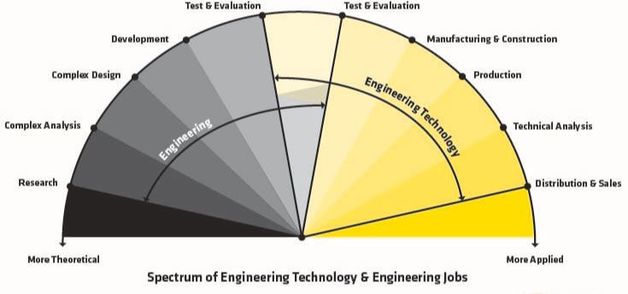|
People who love working with their hands and bringing projects to life are the technologists and technicians within the realm of STEM. For every type of engineer, there is an engineering technologist to assist in project implementation. Installation, operation, troubleshooting and/or repair of machinery and/or equipment is generally handled by engineering technicians. Technologists and technicians differ in their level of education and assigned tasks, yet both career paths have areas of specialization related to the field of engineering they support. Choosing an area of specialization can be challenging, particularly for those participating in two year certificate programs with fast paced, job focused curricula offering little or no general coursework. Internships can be particularly useful for students in this category, as on the job experience is the best way to determine if your field of study is a genuine match for your personality. The Builders and Implementers of STEM Hands on work is essential in the implementation of any type of engineering project. Engineering technologists and technicians bring formal project plans to life by bringing together the pieces that allow the whole to function as intended. By focusing on practical application of the steps involved in actual project execution, degree programs for technologists and technicians have a reduced need for formal coursework in mathematics and science (compared to engineering curricula). If you enjoy working with the actual nuts and bolts which bring things together and want to get started in a well paying career field relatively quickly, work as an engineering technologist or engineering technician may be perfect for you. Engineer vs. Technologist vs. Technician Every type of engineer will have a corresponding engineering technologist and/or technician for support during the implementation phase of projects as well as for ongoing maintenance. So what are the main differences between engineers, technologists and technicians? Generally speaking, engineers are the highest paid members of the group and have completed four or more years of postsecondary education. Coursework encompasses high order math and science and gives engineers the background to create complex plans and blueprints for projects within their field of specialization. Technologists complete degree programs ranging between two and four years in length with curricula focused on the application of engineering concepts rather than their formal development. While pay scales don't generally approach that of engineers, salaries are comfortable for many and technologists often have job openings in a wider range of geographic locations. Technicians typically obtain an associate's degree or technical certificate in their field of interest during a two year program of study. These folks literally work with the nuts and bolts of whatever task is at hand. Jobs are readily available and pay appreciably higher than positions requiring only a high school diploma. Selecting Your Area of Specialization As a technologist or technician, selecting an area of specialization can be particularly challenging since many of these degree programs have highly specific career focused curricula. While this may be appealing for those looking to start their career as quickly as possible, it's important to have a good grasp of your preferred field before investing significant amounts of time in your program of study. Mid-program changes in your area of specialization will create delays in your graduation date and add to the cost of your education. Think about what types of projects you feel most drawn to work with; if you love tinkering with cars, for example, becoming an automotive technician may be a natural choice. Within every field of engineering there are corresponding technologists and technicians, so be sure to follow our blog for next month's entry covering the range of engineering specialists. Additionally, consider spending time as an intern in your field of interest. Experience as an intern not only makes you more attractive to potential employers but is also a powerful tool to help you narrow down the career path best suited for your personality and needs. Some internships, including ours, are paid and are particularly well suited for those interested in working within a geotechnical field of engineering technology. G.E.M. Environmental is committed to providing scholarships, paid internships and useful suggestions to help you attain the career of your dreams. Consider applying for our upcoming STEM scholarship. The deadline to apply is November 23, 2018!
As we continue our exploration of STEM careers, we'll focus on the spectrum of opportunities available to engineers in next month's blog entry. Stay up to date about our upcoming programs and opportunities by signing up for our newsletter! Just scroll to the bottom of our page and click on "Newsletter" (under "Follow Us") to join the G.E.M. family! References https://work.chron.com/engineering-technician-salaries-8047.html http://www.canton.edu/csoet/elec/technician.html https://www.payscale.com/research/US/Degree=Bachelor_of_Engineering_Technology_(BET)/Salary https://en.wikipedia.org/wiki/Geotechnical_engineering |
Categories
All
Archives
June 2024
|
G.E.M. Environmental NFP
Geology - Engineering - Minerals - Environmental - Not for Profit
Geology - Engineering - Minerals - Environmental - Not for Profit
Community Partners
|
Programs
|
Get Involved
|
About
|
Follow Us
|
Sponsors & Donors
|
© COPYRIGHT 2017 - 2023. ALL RIGHTS RESERVED. G.E.M. Environmental NFP
GEM Environmental, GEM4STEM, GEM Corps, and Charity Rocks are all Registered Trademarks of G.E.M. Environmental NFP.
Any and all use of Trademarks or Copyrights must be authorized.
GEM Environmental, GEM4STEM, GEM Corps, and Charity Rocks are all Registered Trademarks of G.E.M. Environmental NFP.
Any and all use of Trademarks or Copyrights must be authorized.

 RSS Feed
RSS Feed


